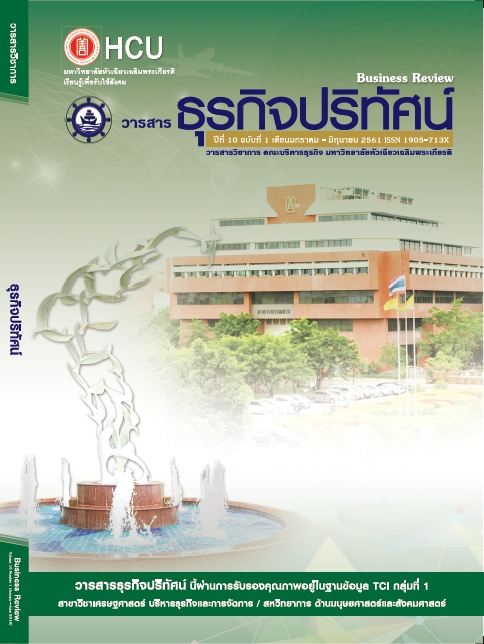The Program Evaluation Research on Master of Management in Industrial Management Academic Year 2017 (Revision) Business Administration Huachiew Chalermprakiet University
Keywords:
Program Evaluation Research, Master of Management (Industrial Management) Business Administration FacultyAbstract
This Research aims to evaluate Master of Management in Industrial Management
Program of Business Administration Faculty Huachiew Charlermprakiet University 2017 by
using CIPP Model for curriculum’s improvement and development guideline in accordance
with its objectives and to the need of learner and society responsiveness.
This research proposed CIPP Model evaluation’s theory by Daniel L. Stufflebeam
comprised of 4 factors: context, input, process, and outputs. The stakeholder comprise of
students, lecturer, undergraduate and supervisor are population. The research instrument’s are
questionnaire, interviews and focus group to analyze frequency, average , standard deviation.
The results revealed that in its opinion of fulltime lecturer agreed to curriculum structure
and subjects and strongly agreed to student’s characteristics including learning and teaching.
The research’s result found that students agreed with structure and subject, learning and
teaching and strongly agree in classmate characteristics. The employer and supervisor
strongly agreed in every factors. For graduate’s overview, strongly agree to characteristic’s
lecturer, thesis and individual study’s advisory, agreed with structure. subjects and
management efficiency. Research finding showed that it must be continuous evaluation
students progress to get further information for the improvement of subject matters and
should be able to apply the requirement for labor market.
References
วิทยาเขตพระราชวังสนามจันทร์.
กาญจนา ไชยพันธุ์. (สิงหาคม 2545). “ตัวบ่งชี้ของผู้สอนกับผู้เรียนเป็นสำคัญ” วารสารวิชาการ. 5 (8)
57-60.
ใจทิพย์ เชื้อรัตนพงษ์. (2539). การพัฒนาหลักสูตร: หลักการและปฏิบัติ. กรุงเทพมหานคร : อลีนเพรส.
ชุติระ ระบอบ. (2549). “ศาสตร์การประเมิน.” เอกสารประกอบการบรรยาย. กรุงเทพมหานคร :
มหาวิทยาลัยธุรกิจบัณฑิตย์.ชุติระ ระบอบ และคณะ. (2559). วิจัยประเมินหลักสูตรการจัดการโลจิสติกส์และโซ่อุปทาน. วารสาร
ธุรกิจปริทัศน์ ปีที่ 9 ฉบับที่ 1 มกราคม-มิถุนายน 2560.
วสันต์ ทองไทย. (2551). การประเมินหลักสูตรจากทฤษฎีสู่ปฏิบัติ. สาขาวิจัยและประเมินผลการศึกษา
ภาควิชาการศึกษา คณะศึกษาศาสตร์ มหาวิทยาลัยเกษตรศาสตร์. [ออนไลน์] แหล่งที่มา http://
www.doed.edu.ku.ac.th/article/eva_curr (19 กรกฎาคม 2559)
สุรางค์ ณรงค์ศักดิ์สกุล. (2559). การประเมินหลักสูตรบริหารธุรกิจมหาบัณฑิต สาขาวิชาวิทยา
การจัดการ มหาวิทยาลัยสุโขทัยธรรมาธิราช. วิทยานิพนธ์ ศศ.ม. (สาขาวิทยาการจัดการ)
บัณฑิตวิทยาลัย : มหาวิทยาลัยเกษตรศาสตร์ วิทยาเขตกำแพงแสน.
Beaucharmp, G.A. (1981). Curriculum Theory. 3rd ed: Llinois : The Kagg Press.
Good, V.C. (1973). Dictionary of Education. 3rd ed. New York: McGraw – Hill.
Kaplan, Robert, and David Nonton. Balanced Scorecard method [Online]. Accessed 7 March
2005. Available from http://www.valuebasedmanagement.net/html
Ralph Winfred Tylor. (1959). “Basic Principles of Curriculum and Instruction.” Chicago:
University of Chicago Press.
Stufflebeam, Daniel L. and Shinkfield, Anthony J. (1990). Systematic Evaluation. Boston :
Kluwer-Nijhoff Publishing.
Taba, Hilda. (1962). Curriculum Development: Theory and Practice. New York : Hardcourt,
Brace and world.
Downloads
Published
How to Cite
Issue
Section
License
All articles published in the Business Administration and Management Journal Review are copyrighted by the journal.
The views and opinions expressed in each article are solely those of the individual authors and do not represent those of Huachiew Chalermprakiet University or any other faculty members. Each author is fully responsible for the content of their own article. Any errors or issues found are the sole responsibility of the respective author.




